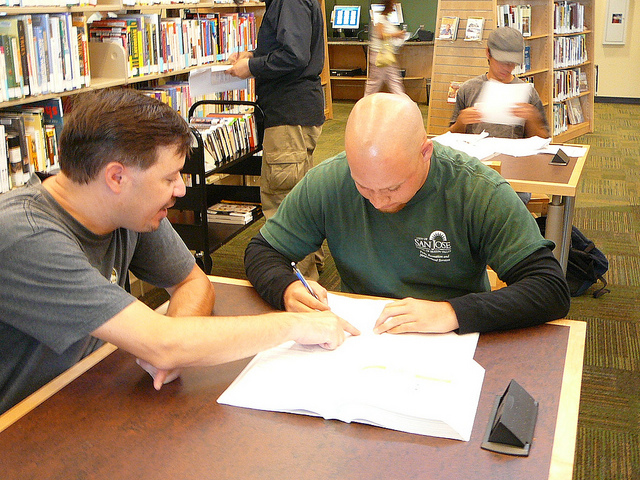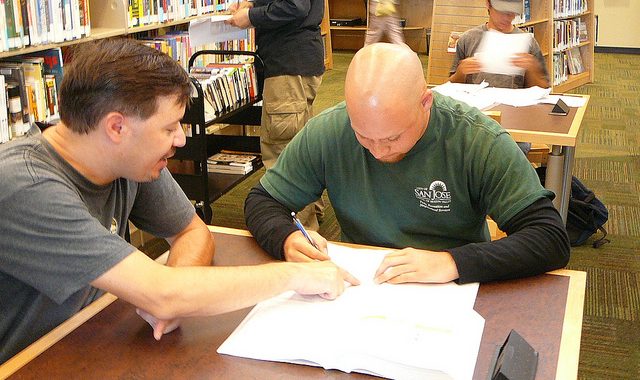 If you’re a college student, or know someone who is, you’ve probably noticed that college isn’t like high school. The work demands more than memorization: more reading, more study time, more writing, and more research. You may feel like you’re in over your head, or that you’re constantly behind. There may even be one or two classes that you feel hopelessly lost in – like you’ll never understand the topic – because everything seems to take so much time and effort.
If you’re a college student, or know someone who is, you’ve probably noticed that college isn’t like high school. The work demands more than memorization: more reading, more study time, more writing, and more research. You may feel like you’re in over your head, or that you’re constantly behind. There may even be one or two classes that you feel hopelessly lost in – like you’ll never understand the topic – because everything seems to take so much time and effort.
You’re not alone. Many students in college report feeling overstressed about the academic demands they’re facing. Many of them end up visiting the campus counseling center for help with anxiety or other psychological problems, and many of them engage the services of a tutor.
However, research shows that while tutoring can improve grades in specific subjects, academic coaching can increase well-being and decrease anxiety and stress for students.
What Is Academic Coaching?
Too often, parents and administrators assume that “academic coaching” is just another term for “tutoring,” and it’s not really surprising that they do. After all, both coaching and tutoring involve one-on-one work with a student on some academic issue like homework or studying, right?
Similarities
Both academic coaching and tutoring are aimed at improving a student’s academic outcomes: their grades, their study habits, and so on.
Both academic coaching and tutoring focus on specific issues that interfere with those outcomes.
Finally, both academic coaching and tutoring happen in a one-on-one environment, focused on the student as an individual.
Apart from those three things, however, tutoring and academic coaching couldn’t be more different!
Differences (and Why Coaching is Important)
- Tutoring is subject-specific. You get a math tutor, or a French tutor, and you learn how to study that one subject.
- Coaching helps you with all your classes across the board, and teaches you study skills that work for all subjects.
- Tutoring is short-term. It helps you with the immediate need (like passing your College Algebra course). Then, once the immediate need is met, the tutoring relationship is over.
- Coaching is (ideally) long-term, lasting as long as several years. This ongoing work with someone you trust helps you develop skills to pass all of your courses.
- Tutoring focuses on specific issues: how to conjugate -ir verbs in Spanish, for example.
- Coaching focuses on the whole individual and how their issues can be interrelated. For example, coaching can show you how being disorganized and not being able to find your notes in your messy backpack can affect your ability to study effectively for the Spanish test, which can make it difficult to pass the Spanish class…
- Tutoring is good for motivated students who need help in specific areas.
- Coaching is good for helping to get students motivated to work the problems that affect their lives both within and outside of school: organization, time management, and so on.
- Tutoring focuses on one or two important needs, like passing an English class, or how to study for a math test.
- Coaching helps students develop strategies for how to study for any class, or how to study for any kind of test.
Which Do You Need?
Both coaching and tutoring are important for college success, but many college students don’t realize that what they need more than anything is the basic college skill set. They came to college with a high-school skill set, and it’s not going to work for the demands of college. It’s not that they don’t study; it’s that they don’t know how to study effectively for college material. It’s not that they don’t understand the concepts in their math course; it’s that they don’t know how to schedule enough time for study and homework. It’s not that they don’t know how to write a paper for their English course; it’s that they don’t realize how many steps it will take or how much planning has to go into a college paper.
Above all, coaching will help a student develop the “soft skills” that are so necessary for success: autonomy, decision-making, confidence, problem-solving, and resilience.
Here’s a short quiz to see whether you need a tutor or a coach.
[mlw_quizmaster quiz=3]
Be sure to check your email for your results!
You may also be interested in:
5 Things to Do on the First Day of an Online Course
Why Grades Are Misleading
Why Making Mistakes is Important
4 Well-Known Study Habits That Don’t Actually Work


I think my son needs some academic coaching. I felt like when he goes home instead of doing his homework first which he finds it so hard to do, he prefers going out with his friends and arrives so late at night with no homework done during the day. As a parent, I’m a little disappointed in him because he shows poor performance at school. I am not a strict parent and I am sure of that. I am just worried about his future because teachers will come to me saying he is a little distracted with some school activities and does not seem to get involved into. Hope to find a good coach for my son. Thanks for sharing this!
We provide academic coaching! It does sound like he needs coaching – please feel free to send me an email so we can talk about his situation.